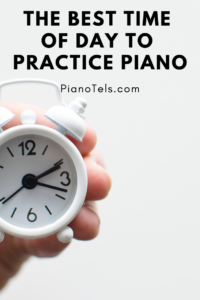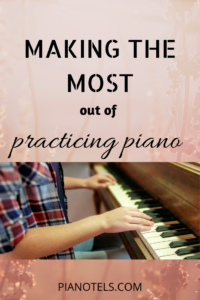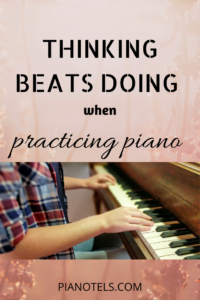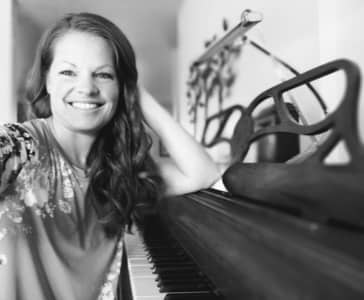Since practicing is the key ingredient to your skills and success in piano, it is definitely worth considering the best time of day to practice.
So, what is the best time of day to practice piano? The best time of day to practice the piano is usually first thing in the morning. The brain has had a fresh start and you are ready and invigorated. There aren’t as many distractions and things to pull you away from the piano, and your brain can focus.
You practice most optimally when you are able to concentrate and your brain is not all cluttered with other things. But why?

The Best Time To Practice: Using Your Brain
Practicing the piano is a brain exercise. Playing the piano is one of the few ways to engage all parts of your brains — both on the left side and the right side. Your brain is sending messages, or synapses, from one side of the brain to the other while you are engaging in playing the piano. It is an amazing brain work-out!
Not only does playing the piano help to exercise your brain, it helps to stimulate the brain and grow new and stronger synapses. (Check out this article for more on the effects of piano playing and the brain: https://elitemusic.ca/research-shows-piano-lessons-alter-brain-function/)
In this study, practicing the piano produced “extensive” white matter in the brain. (Extensive piano practicing has regionally specific effects on white matter development; Published 07 August 2005)
When you play the piano, it is much more than just rote playing and moving of the fingers. In its complete form, practicing the piano is a highly engaging activity in which your brain is vigilantly assessing, planning, and creating the music even before it is played by the fingers.
How to Make the Most Out of Your Practice?
In order to get a complete and efficient practice, you will want your brain to be fresh and invigorated. Here are some suggestions on what you can do to freshen up the brain and get you a good, full, efficient practice.
Drink lots of water.
The brain is one of the first areas to begin to feel the effects of dehydration. Without the proper oxygen and hydration to the brain, it goes without saying that you just aren’t going to be able to function at your best without a lot of liquids flowing through your body. (See ScienceDirect: Water homeostasis in the brain: Basic concepts)
Healthy liquids for the body do NOT include soda or highly caffeinated beverages. High sugar content has the opposite effect of hydration — it takes out the water in order to compensate for the amount of sugar flowing through your body. For every ounce of soda you drink, you will want to drink twice as much in ounces of water.
Exercise.
Once again, we are looking for activities that send fresh oxygen to the brain. Exercise does exactly that. It sends the blood flowing through your body and sends oxygen to the brain. (See ScienceDirect: Exercise: a behavioral intervention to enhance brain health and plasticity)
- A complete workout and a quick shower will do wonders for activating the brain and getting it ready for a serious practice.
- Some quick jumping jacks if you don’t have a lot of time will move that oxygen around and get the blood pumping.
- Yoga – especially when you are putting your head down such as in downward facing dog, causes blood to flow to the brain.
- A brisk walk during a piano practice is good for clearing the brain and giving you a fresh slate.
The first 15 minutes.
In The 15 Minute Study Strategy, it suggests to take just fifteen minutes of pure, not distracted, complete and dog-hearted practice and utilize it so well, that it becomes a powerhouse of fifteen minutes that can replace hours of study. Be very conscious of your time and make the most out of it!
While practice does include training your fingers to work without thought, there is still a great element of thought and effort that goes into your practice. But hours and hours of practice does not always benefit you as much as a pure, undiluted, packed fifteen minutes of die hard practice.
What you DON’T want to do is waste the first fifteen minutes where you are fresh and ready to take on a solid, good practice with rote exercises that just work your fingers. You are wasting your brain power on items that don’t take as much brain power to do!
Instead of using your best time for your brain in rote exercises, begin the practice with a difficult passage. Work through it carefully, deliberately, engaging your brain and taking full advantage of its ability to decipher the passage.
Then, when your brain is exhausted after that first fifteen minutes, give your brain a rest and do some of those rote, finger strengthening exercises and techniques. After giving your brain a rest, you can head back to something a little more difficult, perhaps your second most difficult item on your list.
Plan accordingly.
If you don’t do anything else, at least plan your practices! This is such an important and vital key — perhaps you could even claim it as a shortcut to drastically improving your piano skills:
- Prioritize your goals. What is your main purpose for this practice? You should have between 3-7 goals.
- Plan your most difficult item first. Really use that first fifteen minutes well.
- Add in a brain break between difficult items. Decide if that means doing exercises or a piano activity that takes less brain power, or if that means taking a break to get a drink of water to stay hydrated, do some physical exercise to stimulate the brain, or another technique previously mentioned.
- Allow yourself a little bit of stretch and growth by pushing yourself in your practices, but don’t overdue it. We want to be productive and pushing yourself beyond your limits becomes very counterproductive.
Through your efforts to consciously create your practice before you even start practicing, you are setting the stage for the type of practice you will have. It is WELL WORTH any extra time it takes to deliberately plan out your practice. You will be much more efficient. It is using the adage of working smarter, not harder.
In this hypothesis by Ying Zhang, Ayelet Fishbach, adn Ravi Dahr, they suggest that setting high expectations on goals brings you closer to achieving them, then not setting high expectations. (See When Thinking Beats Doing: The Role of Optimistic Expectations in Goal-Based Choice, Journal of Consumer Research)
So set those goals up high when you plan your practice! Even if you don’t get to all that you had intended.
Silent practicing.
In fact, studies have shown that when your brain is thinking about doing something, it is not unlike actually doing the activity itself. (See Science Direct: Mental practice)
In that regard, there are times I would even say you should practice without a keyboard.
Go through the process in your mind as if you were at the keyboard. Think about how the music will be played; where you will place your fingers, your body, your wrist movement, in order to get the sound you are seeking to perform. Think carefully through your sheet music, noting the more difficult passages and imagining gliding through them with ease.
Practicing in this manner is just a tool to keep in your toolbelt. Obviously, just silent practicing will not always be the most effective strategy for you. So use it as needed and keep it in your toolbelt of effective practice strategies.
Practicing as if performing.
This is a habit that many piano students fall into. It is easy to want to sit at the piano and immediately begin to play a piece, giving your whole heart and soul to your performance, as if you were actually playing to an audience.
While this is good and appropriate at times, be aware of when you allow yourself this luxury during your practice session. Not only is playing in this way going to use up your ideal brain power, it will exhaust your brain before you are able to get into any technicalities and items that you actually need to work on and improve.
Ideally, when you go through a piece in this manner (playing it from front to finish), keep a notepad to take notes, or mark places on your piece of music to remember where and what you need to practice and work on. Prioritize which items are most needed so that you can return to them at the beginning of your next practice.
Create the habit.
The absolute best advice anyone can give you to improve your practices are to actually practice! There is no better way to improve your piano skills than to practice.
The issue at stake here it to make sure that you create a habit of practicing. Set the days and times that work for you and just do it. Every time practice comes up, it is not something you decide then and there whether or not you will, it is something you have already predetermined and you just do it!
Habits are best created and stuck to when it is consistent. Set your goals and then do it. Just don’t forget all the other things we talked about here. Practicing just to practice won’t get you near as far as practicing intentionally, with a plan in mind, strategically choosing which items you complete when.
Related Articles:
7 Things You Can Do Today That Will Change Your Piano Practice Forever
31 Real Ways to Motivate Piano Students to Practice
References:
- https://elitemusic.ca/research-shows-piano-lessons-alter-brain-function/
- Extensive piano practicing has regionally specific effects on white matter development; Published 07 August 2005
- ScienceDirect: Water homeostasis in the brain: Basic concepts
- ScienceDirect: Exercise: a behavioral intervention to enhance brain health and plasticity
- The 15 minute Study Strategy
- When Thinking Beats Doing: The Role of Optimistic Expectations in Goal-Based Choice, Journal of Consumer Research
- Science Direct: Mental practice


Tel loves her life as a piano player, a piano teacher, and a mom. Amid piano blogging, piano teaching, and piano playing, she loves a chance to fit in a good exercise class, volunteer at her kids’ school and at her church, and go on long dates with her husband. Full bio at About Tel.



Thanks Pianotels